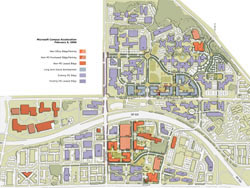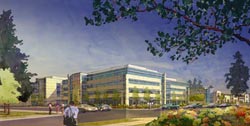REDMOND, Wash., Feb. 9, 2006 — Over the next three years, Microsoft will add 14 buildings and a total of 3.1 million square feet (288,000 square meters) to its corporate campus in Redmond, Wash., enough to provide office space for approximately 12,000 people. Seven of the buildings will be new construction; the other seven are existing buildings that Microsoft recently purchased.
Microsoft announced the new campus expansion plan today at a groundbreaking ceremony attended by Washington State Governor Christine Gregoire, King County Executive Ron Sims, and Redmond Mayor Rosemarie Ives. According to Brad Smith, Microsoft senior vice president, the new plan will accomplish about half of what had been anticipated would unfold over 15 to 20 years when Microsoft outlined its development agreement with the City of Redmond in May 2005. Smith says the accelerated expansion, which is designed to provide ample space for the company’s projected growth, also signals the company’s ongoing commitment to the Puget Sound region.
Before the ceremony, PressPass spoke with Microsoft’s Smith and Redmond Mayor Ives about the reasons for the accelerated campus expansion as well as the opportunities and challenges it represents for the City of Redmond and other local communities.
PressPass: The original plan to expand the Microsoft campus, which was announced in May 2005, called for the expansion to take place over 15 to 20 years. Now, half of that development will be completed during the next three years. Why the acceleration?
Brad Smith: Since the announcement last May, we’ve concluded that we should move forward more quickly than we had planned. Our initial expansion plan was intended to accommodate long-term growth over the next 15 to 20 years, but our space needs for new and current employees is increasing so rapidly that we have decided to complete approximately half of our development goals in the next three years.
That starts today with groundbreaking for the first of seven new buildings. With the construction of these new buildings, and the additional space we have purchased and leased, the Microsoft campus will grow by about one-third in the next three years.

Map shows planned Microsoft campus acceleration in Redmond, Wash., Feb. 9, 2006.
PressPass: Does this acceleration of the campus expansion mean that Microsoft also intends to increase staffing faster than previously planned?
Smith: We will continue to hire quality people to be a part of our Microsoft team as the company grows, but making room for new employees is not the only reason we need more space. We also have overcrowding issues with current employees. By accelerating development now, we will have enough room for the new people that we expect to hire in the coming years, and also relieve our current overcrowding.
PressPass: It sounds like Microsoft plans to stay in Redmond.
Smith: Yes, we like it here. We have said from the beginning that Redmond is our home and we’re going to be here for a long time. This is a very tangible example of our commitment to the region, and an acknowledgement of efforts by our city, state, and county governments to encourage this kind of growth and development for businesses in the Puget Sound region.
Rosemarie Ives: And I’d like to add that Redmond, as well as the entire region, appreciates having a thriving, prominent business like Microsoft commit to maintaining its world headquarters here.
Smith: Thank you.
PressPass: Mayor Ives, will the Microsoft expansion create new opportunities for the community?
Ives: Absolutely. As Microsoft has grown, more of its employees have chosen to reside in Redmond and get involved in community events, schools, and participate on City boards and commissions. In addition, one of the great benefits that Redmond enjoys by being home to Microsoft is the incredible ethnic diversity that this company has brought to our community.
Microsoft’s expansion also benefits Redmond by linking our future growth to a clean, environmentally safe industry that contributes to the employment base with good paying jobs. Further, Microsoft has also partnered with the City and Puget Sound leaders to develop, advocate for and implement important regional commitments, like the transportation infrastructure that must accompany growth.
PressPass: Does the expansion pose any challenges for nearby communities or state and local governments?
Ives: Microsoft’s expansion plans are consistent with Redmond’s comprehensive plan and with the policies, plans and interlocal agreements already in place that address growth in the Overlake area. The fact that Microsoft and the City have negotiated a development agreement helps to reaffirm these plans and enables Redmond, as well as our neighboring jurisdictions, to have a better sense of the pace of the development the City had already anticipated, and better be able to accommodate it. This helps local and regional service providers to address important future needs like transportation, energy, and water and sewer infrastructure.
PressPass: This accelerated campus construction and acquisition certainly leads to issues regarding transportation. How are those issues being addressed?
Smith: For Microsoft, this expansion means that we need to address how people are going to move through our campus. That’s why Microsoft has committed US$35 million to help finance improvements to local infrastructure, including construction of an additional overpass for State Route 520 to facilitate easier movement between the east and west sides of the campus. We will also add more campus entry points, and make improvements to nearby surface streets.

Artist’s rendering of the first of seven new buildings planned for Microsoft’s Redmond, Wash. campus. The future Building 99 will replace an existing building at the NE corner of 148th Ave. NE and NE 36th St.
Ives: From the City’s perspective, the most important need is a regional commitment for significant safety and capacity improvements in the 520 corridor. The Eastside has clearly emerged as a major economic center in the state. With over 30,000 jobs located just at Microsoft, combined with the employment populations of other Overlake employers and the thriving employment districts emerging in downtown, Willows Road and Southeast Redmond, a strong case is presented in Redmond alone for infrastructure investments to support economic development. Combine the Redmond employment picture with other major employment centers that already exist and are expanding in Bellevue and Kirkland, and it becomes clear that working together to advance transportation solutions in the 520 corridor is key.
Smith: I agree with Mayor Ives. The future of 520 as both a bridge and a corridor is very important. The state and the county play key roles in this decision, and we are confident that this is something both governments recognize as a need that must be addressed.
PressPass: How will municipal, county and state governments respond to these challenges?
Ives: The City of Redmond has a history of working well with other public agencies to implement its vision and plans and fulfill the commitments of our regional partnerships. Redmond expects that many other public entities will benefit from the knowledge of Microsoft’s plans and work together to address a variety of regional needs, not the least of which is transportation. In fact, Microsoft’s announcement is very pivotal in terms of how public agencies like the City of Redmond can responsibly assign an appropriate level of resources in support of a stable and vital economy.
PressPass: What does this expansion say about Microsoft’s confidence in the future?
Smith: We are very bullish about what we see in our business sector over the next few years, and confident about the growth of our company. We are poised to continue the innovations Microsoft has been known for since the company was founded more than 30 years ago.
PressPass: Mayor Ives, do you expect Microsoft’s growth as a company and an employer to have long-term economic benefits for this region?
Ives: Absolutely. Microsoft’s presence has already proven to be linked to ancillary economic benefits in the area. New businesses have been attracted to Redmond that provide services to Microsoft and the large daytime population that it creates. Microsoft’s presence in Redmond has had a magnetic quality that has attracted other technology businesses to the area, especially in bio-medical and video gaming industries. Businesses who believe that their products or services have a “global” appeal have also pursued a Redmond address, in part, because of the world recognition associated with being in the same city that Microsoft calls “home.” There is definitely a multiplier effect!
Further, it’s worth noting the benefit of having a business that fared well while many other businesses suffered during a period of economic decline. Microsoft’s growth will certainly be an economic plus for Redmond and the region.




